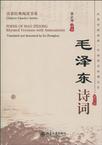毛泽东诗词
出版时间:2010-4 出版社:北京大学出版社 作者:译者:辜正坤 页数:305 译者:辜正坤 注释
Tag标签:无
前言
The poet whom we are to read occupies a curious but assured position in the history of 20th century Chinese literature: curious,because he was one who theoretically advocated with all his heart the development of modern poetry——the free verse written in the vernacular——and even hopefully asserted that the bright future ofChinese poetry lay right in the development of folk-songs, yet inpractice, he himself almost never wrote poetry in plain Chinese but in acompletely traditional and classical style; assured, because he composedthe poetry so well that, at his best, few modern Chinese poets can rival him. To Western minds, he is a political giant who, though shaking oldChina to its foundation, remains a debatable figure as to his contribution to the creation of a better world. But what captures our attention here is Mao the poet, not Mao the statesman; still politically a subject of controversy at home and abroad, he is, however, almost universally acknowledged as a successful poet of rare talent, even, to a moderatedegree, by his sworn enemies.
内容概要
本书含有英诗格律体翻译的毛泽东诗词及他人与毛泽东唱和的诗词约五十首。英译忠实、道地、精美,被誉为迄今为止国内外难得的优秀译本。本书另一重大特色是对每首诗词的历史背景、主题、典故等进行了较详细的注释。诗前有长篇导言,对毛泽东诗词的思想内容、艺术风格、语言技巧等进行了总体阐述。诗后附有毛泽东有关诗词的书信三封。原诗与译诗采用汉英对照形式。诗词原文附汉语拼音。书后附有详尽的索引,便于查阅。
书籍目录
前言 正编 贺新郎 赠杨开慧 沁园春 长沙 菩萨蛮 黄鹤楼 西江月 井冈山 清平乐 蒋桂战争 釆桑子 重阳 如梦令 元旦 减字木兰花 广昌路上 蝶恋花 从汀州向长沙 渔家傲 反第一次大“围剿” 渔家傲 反第二次大“同剿” 菩萨蛮 大柏地 清平乐 会昌 十六字今三首 忆秦娥 娄山关 七律 长征 念奴娇 昆仑 清平乐 六盘山 沁园春 雪 七律 人民解放军占领南京 七律 和柳亚子先生 浣溪沙 和柳亚子先生 浪淘沙 北戴河 水调歌头 游泳 蝶恋花 答李淑一 七律 送瘟神二首 七律 到韶山 七律 登庐山 七绝 为女民兵题照 七律 答友人 七绝 为李进同志题所摄庐山仙人洞照 七律 和郭沫若同志 卜算子 咏梅 七律 冬云 满江红 和郭沫若同志 七律 吊罗荣桓同志 贺新郎 渎史 水凋歌头 重上井冈山 念奴娇 鸟儿问答 副编 七古 送纵字一郎东行 西江月 秋收起义 六言诗 给彭德怀同志 临江仙 给丁玲同志 浣溪沙 和柳【亚子】先生 七律 和周世钊同志 念奴娇 井冈山 虞美人 枕上 附录 关于诗的一封信 给胡乔木同志的信 给陈毅同志谈诗的一封信 索引
章节摘录
插图:1.The People's Liberation Army Captures Nanking:Soon after the Anti-Japanese War in 1946 there broke out the Civil War between the armies under Kuomintang and those under the Chinese Communist Party. From September 1 948 to January 1 949,the People'S Liberation Army won three smashing victories respectively in Liaoshen Battle,Huaihai Battle,and Pingjin Battle.The greater part of the land beyond the north of the Yangzi River Was under the control of the People's Liberation Army.At this critical hour, peace talks were tried but in vain.On April 21,1949,the People's Liberation Army launched a general attack upon the line of defense 011 the part of the Kuomintang Armies.On April 23,Nanking,the political centre of the Kuomintang government,Was captured by the People's Liberation Army.At the news of the victory, Mao Zedong,wild with joy, rushed off the poem and sent it immediately to the front by telegramme in order to encourage the soldiers and civilians on the front.This poem Was first published in the 1963 edition of Poems of Chairman Mao(People's Literature Press,Peking,1963).2.the Bell Mountain:a mountain located in the eastern suburb of Nanking,7 kilometres in length,3 kilometres in breadth,with the main peak of 1,257 feet above the sea level.The mountain in the sunlight looks purple, thus it is also called Purple Gold Mountain(Zijinshan).3.Once a den of tigers and dragons:a metaphor used by Zhuge Liang ra famous statesman and military strategist in the Shu State of the Three Kingdoms)to describe the meandering Bell Mountain in Nanking and the steepy Stone City in Nanking respectively as a dragon and a tiger.
编辑推荐
《毛泽东诗词(修订版)》:英汉对照韵译,汉语拼音标调注音,汉语经典阅读书系。
图书封面
图书标签Tags
无
评论、评分、阅读与下载
用户评论 (总计46条)
- 很喜欢辜正坤教授翻译的这版《毛泽东诗词》,与以前读的官方版本相比,这版诗词的译法更加灵活,更具文学性。不过还是更喜欢原文的激扬文字。
- 因为这本书即有汉语,也有英文,让我即有学到毛泽东的诗,又能学会翻译他的诗!
- 这是我现在买的最好的一本双语诗词。很好
- 毛主席诗词在我们民众心中有很深的魅力,艺境高逸,毛主席的诗词书法皆显之伟大杰作。很喜欢,细细品读,认真学习。
- 比较全面的收录了毛主席的诗词,值得学习和阅读
- 买来才发现双语的,印刷质量还可以吧,应该对得起这个价格。文字较大,有汉语拼音,诵读还是挺方便的!
- 本来以为是既有中文注释,又有英文注释,拿到手才知只有拼音标注和英文注释,而没有中文的介绍。请大家买的时候注意,这主要是给老外看的版本。
- 中英文对照,还有拼音标注,非常好!
- 好书英文对照的
- 纸质不错,印刷挺正规的,挺喜欢那些英文翻译的,但我儿子英文水平一般看不懂
- 我是学英语的,翻译的太到位了。
- 最近在学英语,刚好这个中英版本的还可以学学怎么翻译!
- 很好,英汉两个版本,喜欢这本书
- 此书内容比较丰富也很全面值得收藏1
- 这个商品不错 挺好的 帮同学买的 她很喜欢
- 纸张印刷质量较好,还没有研读。
- 英文的 买错了
- 英汉双文,不错不错,很喜欢
- 世上无难事只要肯攀登
- 大气滂沱 不乏精工细雕
- 一本很值得收藏的好书
- 当代最伟大的诗作,无人企及.
- 好像更适合外国认读
- 大气的文笔值得阅读
- 帮同学买了送给他爸爸的 不过我没小心买的是中英文版的 好囧 嘿嘿 但他爸爸还蛮满意的啦
- 向送货员致敬!
- 棒别人买的
- 给老娘买的,她喜欢。但是英文部分她用不上。
- 爸爸买的,他说很好
- 东东不错啊。东东不错啊。东东不错啊。
- 很好,对相关的研究者很有用
- 纯粹是因为是老师写的才买的
- 这本书很全面,有拼音,有英文,还有解释,不错。值得一买。
- 中英文,可惜没有详解,最好结合当时的历史背景啊!
- 毛主席的词就是霸气,张扬
- 这个商品不错,没想到是中英双语的
- 好,伟人胸怀
- 值得买,好书。
- 英文没什么用对中国人来说
- 看个人喜好了,觉得一般,跟预期的有差距
- 一本好书,送货也快,谢谢!
- 里面没有注释
- 难得的中英文翻译
- 无货收到才发现没有和其他书一起收到,但是当当仍旧给打了折
- 可取之处:有毛主席的墨迹共品赏;但解释也是英文的,好像是专供外籍人士阅读的,国人没必要买此版本。
- 1.商品的介绍并不全面,这个版本是毛泽东诗词的英文翻译,介绍内容的并不全面,对于非英语专业或有特殊爱好的人并不适用2.客观的说,翻译的还是蛮不错的
